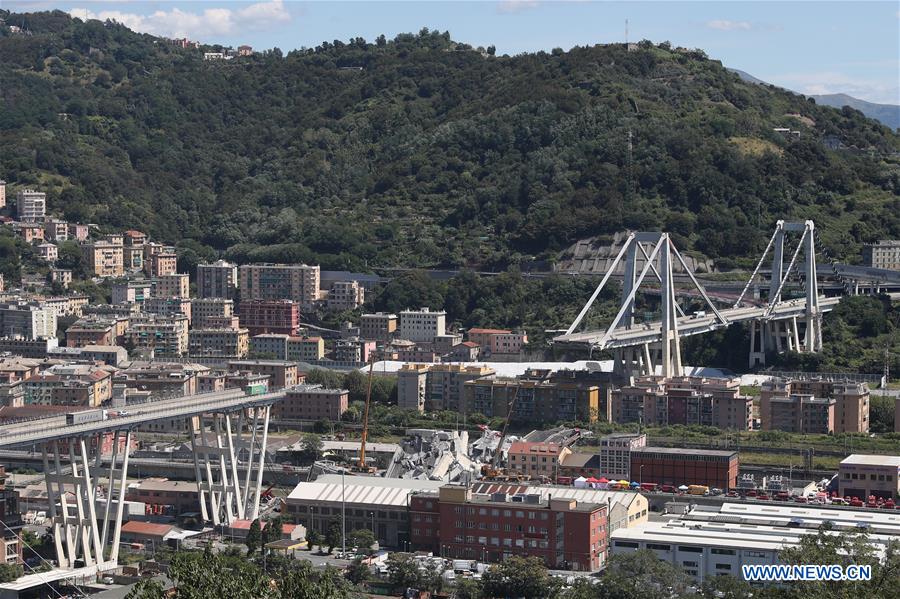Fallout from Italy's tragic bridge collapse jitters investors
Xinhua | Updated: 2018-08-17 09:27

ROME - A collapsed bridge that resulted in the deaths of 39 people is unnerving investors in both the private company that operated the bridge and the cash-strapped Italian government that now planning to dramatically increase the amount it spends on infrastructure maintenance.
Tuesday's tragic event, which took place just outside the northern coastal city of Genoa, has been in headlines around the world since it happened.
The news has been bad for Atlantia, the holding company that controls highway operator Autostrade per l'Italia, which has the concession to operate the Morandi Bridge. In the two trading sessions since the event took place -- there was no trading in Italy on Wednesday, a national holiday in Italy -- the company has lost more than a fourth of its value, a loss on paper of more than 5 billion euros ($5.7 billion). On both Tuesday and Thursday, the company's shares were the most traded issues on Milan's Italian Stock Exchange.
Analysts said investors were spooked by comments from Italian Prime Minister Giuseppe Conte, Minister of Transportation Danio Toninelli, and Minister of Labor Luigi Di Maio, who said they wanted to remove Autostrade per l'Italia's government concessions, as well as worries about costs related to the tragedy.
Andrea Ciarini, a sociology of economics professor at Rome's La Sapienza University, said the sell-off of shares could be premature.
"We don't know anything yet," Ciarini told Xinhua. "We don't know what the investigations will turn up, we don't know if the government can remove the concession or if they want to do it for all their holdings or just the bridge, and we don't know if they want to replace them with another company or if the intention is for the state to take over."
Conte, Toninelli, and Di Maio all said that the government should step in. But Angela Bergantino, president of the Italian Scientific Association of Transport Economics, said it remains unclear whether that will really happen.
"I think the statements are political or emotional," Bergantino said in an interview. "I don't believe anyone is making technical assessments yet."
Italy privatized its national road network starting in the 1990s, in part to improve efficiency and attract fresh investment.
Matteo Salvini, the interior minister of Italy, said Wednesday that Italy's Civil Protection Agency estimated it would cost at least 40 billion euros (46 billion U.S. dollars) to maintain the country's infrastructure and safeguard it against heavy use as well as natural disasters like floods, landslides, and earthquakes.
Italy cannot possibly spend that amount on infrastructure -- the figure is the equivalent to more than a tenth of the government's annual budget this year -- but Salvini said he wants to use that argument to ask the European Union to give the country more flexibility for its 2019 budget under budget deficit rules.
Financial analysts said fears that Italy could add to debt figures, which was already the second highest in the European Union in terms of a percentage of gross domestic product, have made some investors worry that the country might have a hard time paying off its debt. Those fears have also pushed bond yields higher, increasing the amount the government has to pay to borrow money.
So far, the EU officials have not commented specifically on Salvini's remarks, but they have noted that in April they approved an extra 8.5 billion euros ($9.6 billion) in investments for highway maintenance, including some for the area around Genoa. The country is also receiving another 2.5 billion euros ($2.9 billion) in European funds for infrastructure over the six-year period ending in 2020.
The Paris-based Organization for Economic Cooperation and Development (OECD) reports that Italy's spending on roads, highways, and bridges fell by 58 percent between 2008 and 2015.
But Bergantino said Italy spends more than most countries on transport infrastructure. "Between 2005 and 2015, Italy spent an average of 9.1 billion euros ($10.4 billion) for maintenance of its transport network. That is 3.5 times more than in France and 2.1 times more than in the United Kingdom." Those two countries are the European states with population numbers most similar to Italy and both have larger economies.
Maurizio Crispino, an engineering professor at the Polytechnic University of Milan, said the tragedy in Genoa should be kept in perspective.
"What happened Tuesday in Genoa was an immense tragedy," Crispino told Xinhua. "But around 4,000 people a year die on Italian roads and highways, or around 11 per day. That number is down from 6,000 several years ago, thanks to changes to safety measures on the roads and in cars themselves. An average of 11 per day is still too many, but my point is that things improve through gradual and studied changes. Not quick decisions."
























